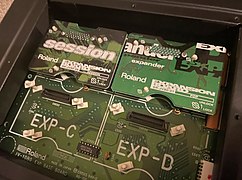Roland JV-1080
| Roland JV-1080 | |
|---|---|
 | |
| Manufacturer | Roland |
| Dates | 1994–2001 |
| Technical specifications | |
| Polyphony | 64 voices |
| Timbrality | 16-part multitimbral |
| Oscillator | 4 tones per voice |
| LFO | 2 per tone, with eight waveforms |
| Synthesis type | Sample-based synthesis |
| Filter | 1 TVF (Time Variant Filter) per tone, with resonance and its own envelope |
| Attenuator | 1 TVA (Time Variant Amplifier) per tone |
| Input/output | |
| Keyboard | none |
| External control | MIDI (In, Out, Thru)[1] |
The Roland JV-1080 (a.k.a. Super JV, Super JV-1080, or simply 1080) is a sample-based synthesizer/sound module in the form of a 2U rack. The JV-1080's synthesizer engine was also used in Roland's XP-50 workstation (1995). Due to its library of high-quality sounds and multi-timbral capabilities, it became a mainstay with film composers.[2]
Features
The JV-1080 features a 64-Voice Polyphony, as well as 16-part Multi-timbral capabilities. From the factory, the JV-1080 comes with hundreds of patches, and several rhythm kits (8 megabytes total). It can be expanded with up to 4 SR-JV80 expansion cards, as well as a PCM and Data card, to provide up to 42 megabytes.
Factory Sounds
The core sampled waveforms of the JV-1080 were developed by Roland R&D-LA in Culver City, California.
Many of the most well-known Factory presets and Xpansion board sounds of the JV-series were created by Eric Persing of Spectrasonics and Ace Yukawa.
Notable users of the JV-1080
- 808 State
- Arthur Baker[3]
- Bradley Joseph
- Dario G[4]
- Depeche Mode
- Dubstar
- Eliot Kennedy[5]
- Franco Battiato
- Gary Barlow[6]
- Giorgio Faletti
- Hans Zimmer
- Ihsahn
- Jens Gad
- Jens Johansson
- Jerry Martin[7]
- Keith Zizza
- Kenji Kawai
- Luis Delgado
- Michael Jackson
- Nathan McCree
- Philip Pope
- Keith Hopwood
- Paul Van Dyk
- Ping Pong
- Roddy Bottum[8]
- Rhythm Plate
- Tony Banks
- Vangelis
- Vince Clarke
- Tame Impala
- Grant Kirkhope
- RMB
- Paul Shaffer[9]
Expansion Cards
The SR-JV80 expansion cards can be used in the Roland XP-50, XP-60, XP-80, JV-1080 and XV-5080, which can each hold four expansion cards, as well as the JV-2080, which can hold eight expansion cards.[10][11]
The three Experience expansion boards contain a selection of sounds from different expansion boards in a single card.[12]
- SR-JV80-01: Pop[13]
- SR-JV80-02: Orchestral
- SR-JV80-03: Piano
- SR-JV80-04: Vintage Synth
- SR-JV80-05: World
- SR-JV80-06: Dance*
- SR-JV80-07: Super Sound Set
- SR-JV80-08: Keyboards of the 60s & 70s
- SR-JV80-09: Session
- SR-JV80-10: Bass and Drums
- SR-JV80-11: Techno
- SR-JV80-12: Hip-Hop
- SR-JV80-13: Vocal
- SR-JV80-14: Asia
- SR-JV80-15: Special FX
- SR-JV80-16: Orchestral II
- SR-JV80-17: Country
- SR-JV80-18: Latin World
- SR-JV80-19: House
- SR-JV80-97: Experience III[14]
- SR-JV80-98: Experience II
- SR-JV80-99: Experience
Notice: Due to copyright problems Roland no longer distributes the Dance expansion board.
- JV-1080 opened revealing expansion cards
- SR-JV80 cards on top of a JV-1080
References
- ^ "Roland Super JV1080". Sound on Sound. December 1994. Archived from the original on 10 June 2015.
- ^ "Blast from the past: Roland JV-1080". 10 October 2018.
- ^ "Arthur Baker: From Planet Rock To Star Maker". Sound On Sound. June 1997. Archived from the original on 6 June 2015.
- ^ "Dario G: Recording SunMachine". Sound On Sound. October 1998. Archived from the original on 3 March 2016.
- ^ "Eliot Kennedy: Producing Sheffield Music". Sound On Sound. September 1997. Archived from the original on 7 June 2015.
- ^ "Gary Barlow: Recording, Production & Songwriting". Sound On Sound. November 1998. Archived from the original on 16 September 2014.
- ^ "Recording Studio Equipment List". Jerry Martin Music. 24 October 2007. Archived from the original on 23 July 2019.
- ^ Keyboard magazine, September 1997.
- ^ Ferrante, Michael (January 24, 2006). "Shaffer's Keyboard Rig Setup?". Sweetwater Sound. Retrieved 2023-03-19.
- ^ "SR-JV80 Expansion Boards". www.planet-groove.com. Retrieved 2022-10-11.
- ^ "Roland XV-5080 128-Voice Synth Module". www.roland.com. Retrieved 2023-01-03.
- ^ "Roland JV Series Synthesizers & Expansion Card Buying Guide | Reverb". reverb.com. Retrieved 2022-10-11.
- ^ "The History Of Roland: Part 4". 2005-02-01.
- ^ "SR-JV80-97 Experience III".
Further reading
- "Roland JV-1080". Future Music. April 1995. ISSN 0967-0378. OCLC 1032779031.



